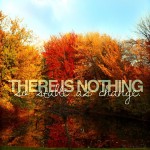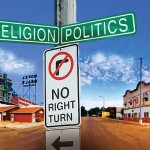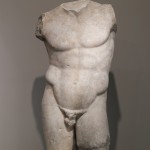“God is dead. […] And we have killed him. How shall we comfort ourselves, the murderers of all murderers? […] What water is there for us to clean ourselves? What festivals of atonement, what sacred games shall we have to invent?”
— Nietzsche, The Gay Science
Over at Patheos, bloggers are being asked to write about their “defining moments”, “moments where we move from our chosen path……it is in those moments that our future is determined and our faith is tested.” John Beckett and Jason Mankey have posted their responses which are great to read.
When I think about defining moments in my own spiritual journey, the moment that pops immediately into my mind was a realization I had in the year 2000. I don’t even remember where I was. I just remember my internal experience of the realization. It was the culmination of what seemed like a long and difficult struggle to make sense of my Mormon faith. And when it hit I felt all the exhilarating fear and joy that such realizations bring.
The realization was this:
I had created God in my own image.
Or rather I had created God in the image of a part of me: the stern, cold, judgmental part of me. I realized that this Being whose disapproval I had felt breathing hot and heavy down upon my for 25 years was actually me. It all made sense. It was like looking in the mirror for the first time. Jung writes that we must withdraw God from a projection into object and return it into the soul. When this happens “the libido [energy] invested in God, i.e., the surplus value that has been projected, is recognized as a projection the object loses its overpowering significance, and the surplus value consequently accrues to the individual, giving rise to a feeling of intense vitality, a new potential.” That is how I felt, an “intense vitality” and “a new potential”.
That moment was a defining moment for me. I realized then that I didn’t know who God was at all. And it opened me up to seek another image of God, a God of universal love, who I eventually found (strangely) in the words of Alanis Morissette’s song “You Owe Me Nothing In Return”. Of course, I then realized that that God of universal love was me too.
I’ll give you countless amounts of outright acceptance if you want it
I will give you encouragement to choose the path that you want if you need it
You can speak of anger and doubts your fears and freak outs and I’ll hold it
You can share your so-called shame filled accounts of times in your life and I won’t judge it […]
You can ask for space for yourself and only yourself and I’ll grant it
You can ask for freedom as well or time to travel and you’ll have it
You can ask to live by yourself or love someone else and I’ll support it
You can ask for anything you want anything at all and I’ll understand it […]
You can express your deepest of truths even if it means I’ll lose you and I’ll hear it
You can fall into the abyss on your way to your bliss I’ll empathize with
You can say that you have to skip town to chase your passion and I’ll hear it
You can even hit rock bottom have a mid-life crisis and I’ll hold it […]
That led me to the further insight that, if I had unconsciously made God in my own image, I could do it again, but this time with more wisdom and grace. And that led me to embrace Paganism. Voltaire wrote: “If God has made us in his image, we have returned him the favor.” Similarly, Benjamin Disraeli, wrote: “Man is born to believe. And if no Church comes forward with its title-deeds of truth to guide him, he will find altars and idols in his own heart and his own imagination.” When I discovered Paganism, it seemed like a religion that embraced this truth. It was the perfect vehicle for making gods. If all gods are created by us, I thought, why not embrace the fact and go about doing it consciously. To me, invented religions, religions of the imagination, like The Church of All Worlds and Jediism and seemed to be the most true, because they were the most honest.
Eventually, though, I realized that we do not so much make the gods as discover them, running wild beneath the surface of the world and our minds. At the very best, god-making is only partially conscious endeavor. As James Hillman explains, “Just as we do not create our dreams, but they happen to us, so we do not invent the persons of myth and religion [i.e., the gods]; they, too, happen to us.” (emphasis Hillman’s). I learned that William Ingham was right, when he wrote in 1872: “An invented religion may serve the purposes of a philosopher; but dying men and women call for a revelation and a ‘living God’” (Lectures on the Evidences of Natural and Revealed Religion) — although not quite in the way that Ingham meant it.
But all this began with that moment when I realized that “Heavenly Father” (The Monster at the End of this Book) was little old me — that was my defining moment. It led me to leave the Mormon church, it led me to discover the grace of God within me, and eventually it led me to Jungian Paganism.











